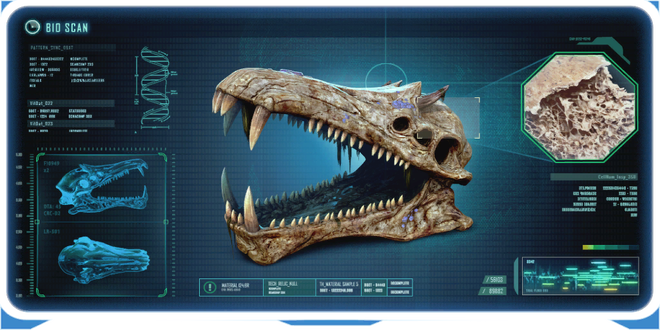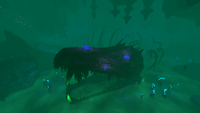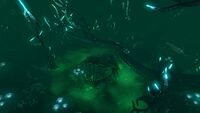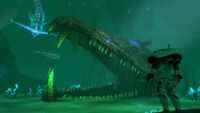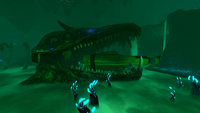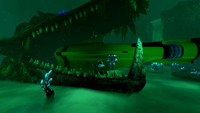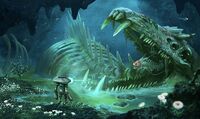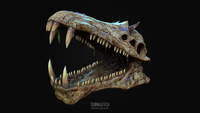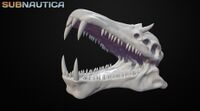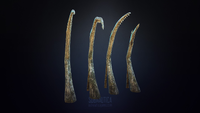Gargantuan Fossil: Difference between revisions
No edit summary |
(changes the wording to be clearer) |
||
| Line 26: | Line 26: | ||
The skeleton is enormous. The skull by itself is just under 100 meters in length, almost as long as the entire body of a Sea Dragon Leviathan. The two lower front teeth measure at 11.4 meters in height and the two upper teeth at 10.3 meters. The largest of the structures resembling eye sockets measure 9.7 metres in diameter. |
The skeleton is enormous. The skull by itself is just under 100 meters in length, almost as long as the entire body of a Sea Dragon Leviathan. The two lower front teeth measure at 11.4 meters in height and the two upper teeth at 10.3 meters. The largest of the structures resembling eye sockets measure 9.7 metres in diameter. |
||
The skeleton that remains measures at 402 meters in length, and with the PDA estimating that it is only one third of the complete specimen, the creature would have measured between 1,100 and 1,500 meters long. Due to this, it has lived far out from the [[Crater Edge]], as there is absolutely no possible way that it lived within the [[The Crater| |
The skeleton that remains measures at 402 meters in length, and with the PDA estimating that it is only one third of the complete specimen, the creature would have measured between 1,100 and 1,500 meters long. Due to this, it has lived far out from the [[Crater Edge]], as there is absolutely no possible way that it lived within the [[The Crater|Crater]]. |
||
==In Life== |
==In Life== |
||
When this creature still roamed the planet, the sheer size of its body would have prevented it from living within the |
When this creature still roamed the planet, the sheer size of its body would have prevented it from living within the Crater. |
||
The size of the creature would have restricted it to live entirely in the Crater Edge tens of kilometers away and probably even hundreds as an adult or even as a juvenile. As little is known of life outside of the crater, it is not clear what it could have preyed on or if the prey species still exists: the most likely current known species that reside within the preys' caliber today would be [[Reefback Leviathan|Reefback Leviathans]], [[Ghost Leviathan|Adult Ghost Leviathans]], [[Sea Dragon Leviathan|Sea Dragon Leviathans]], [[Sea Emperor Leviathan|Sea Emperor Leviathans]] possibly even the [[Ancient Skeleton]]. |
The size of the creature would have restricted it to live entirely in the Crater Edge tens of kilometers away and probably even hundreds as an adult or even as a juvenile. As little is known of life outside of the crater, it is not clear what it could have preyed on or if the prey species still exists: the most likely current known species that reside within the preys' caliber today would be [[Reefback Leviathan|Reefback Leviathans]], [[Ghost Leviathan|Adult Ghost Leviathans]], [[Sea Dragon Leviathan|Sea Dragon Leviathans]], [[Sea Emperor Leviathan|Sea Emperor Leviathans]] possibly even the [[Ancient Skeleton]]. |
||
Revision as of 19:43, 22 January 2021

|
Read at own risk This article contains unmarked spoilers. Players new to the game would want to avoid or be cautious toward this article. |
<infobox layout="stacked">
<title source="title" style="font-weight:bold; text-align:center;"> <default>Gargantuan Fossil</default> </title> <image source="image">
</image> <label>Age</label> <label>Status</label> <label>Biome</label> <label>Length</label> <label>Coordinates</label> <label>GoTo</label> <label>Debug Spawn</label> </infobox> The Gargantuan Fossil is an enormous and ancient fossil, approximately three million years old, found in the Bone Fields. The skeleton belonged to an eel-like, possibly above Leviathan Class apex-predator dwarfing both the Sea Dragon Leviathan and Sea Emperor Leviathan combined, despite only being around one third of the whole skeleton. The remains consist of a huge, vaguely reptilian skull and sixteen pairs of huge ribs. The skeleton is covered in flora and coral. The skull is so large that a Cyclops can fit inside its jaws. Smaller versions of its ribs can be seen in the entrance to the Lost River Junction, while a much smaller but otherwise identical skull which also gives the Gargantuan Fossil scan can be found in the Ghost Forest, presumably from a juvenile example of the species. The Precursors were also studying these remains, as evidenced by small, angular indentations on the ribcage. These samples were probably studied at the Lost River Laboratory Cache, as this was the main site in which Leviathan class bone samples are found.
Resting Place
How it came to rest in the Lost River is difficult to explain, as it seems unlikely that such a limited biome would be a colossal creature's natural habitat: the only real clue given is that the PDA log states that geological changes have occurred, and that the creature could not have entered the Bone Fields in their current configuration. Given the intact nature of the bones, one possibility is that the Lost River represents a natural tunnel system the creature entered in the distant past, now choked with vegetation and partially collapsed such that it could not enter them in their modern arrangement. It is possible that its body is sealing up a tunnel that it used to enter, since that would explain why two thirds of it is underground.
The cause of death cannot be identified from the remains: there is, however, no evidence the creature died of something other than old age or some other natural cause. Whether the infant creature was related to the adult or their proximity is simply a coincidence is also not clear.
The skeleton is currently covered in amoeboids. They are likely digesting the matter that makes up its bones, forming a parasitic relationship.
Size
The skeleton is enormous. The skull by itself is just under 100 meters in length, almost as long as the entire body of a Sea Dragon Leviathan. The two lower front teeth measure at 11.4 meters in height and the two upper teeth at 10.3 meters. The largest of the structures resembling eye sockets measure 9.7 metres in diameter.
The skeleton that remains measures at 402 meters in length, and with the PDA estimating that it is only one third of the complete specimen, the creature would have measured between 1,100 and 1,500 meters long. Due to this, it has lived far out from the Crater Edge, as there is absolutely no possible way that it lived within the Crater.
In Life
When this creature still roamed the planet, the sheer size of its body would have prevented it from living within the Crater.
The size of the creature would have restricted it to live entirely in the Crater Edge tens of kilometers away and probably even hundreds as an adult or even as a juvenile. As little is known of life outside of the crater, it is not clear what it could have preyed on or if the prey species still exists: the most likely current known species that reside within the preys' caliber today would be Reefback Leviathans, Adult Ghost Leviathans, Sea Dragon Leviathans, Sea Emperor Leviathans possibly even the Ancient Skeleton.
They were likely very long-lived with a low reproductive rate, as a large population of these creatures would very quickly outpace the ability of prey species to repopulate.
The reptilian skull may suggest distant relation/common ancestor to the Sea Dragon and, by extension the Sea Emperor, though these similarities may be purely superficial. It is also possible that rather than the rib cage having toppled over into an upside-down state, the rib cage is in fact the correct way up and this creature had a similar skeletal structure to the Sea Dragon, specifically sharing its inverted ribcage.
Data Bank Entry
Gallery
<tabber> Screenshots=
|-| Concept Art=
|-| Models=
Model from Sketchfab
Highpoly model from Sketchfab
Older WIP model from Sketchfab
Models of ribs from Sketchfab
|-| Size Comparisons=
</tabber>
Lua error in package.lua at line 80: module 'Dev:Navbox' not found.

